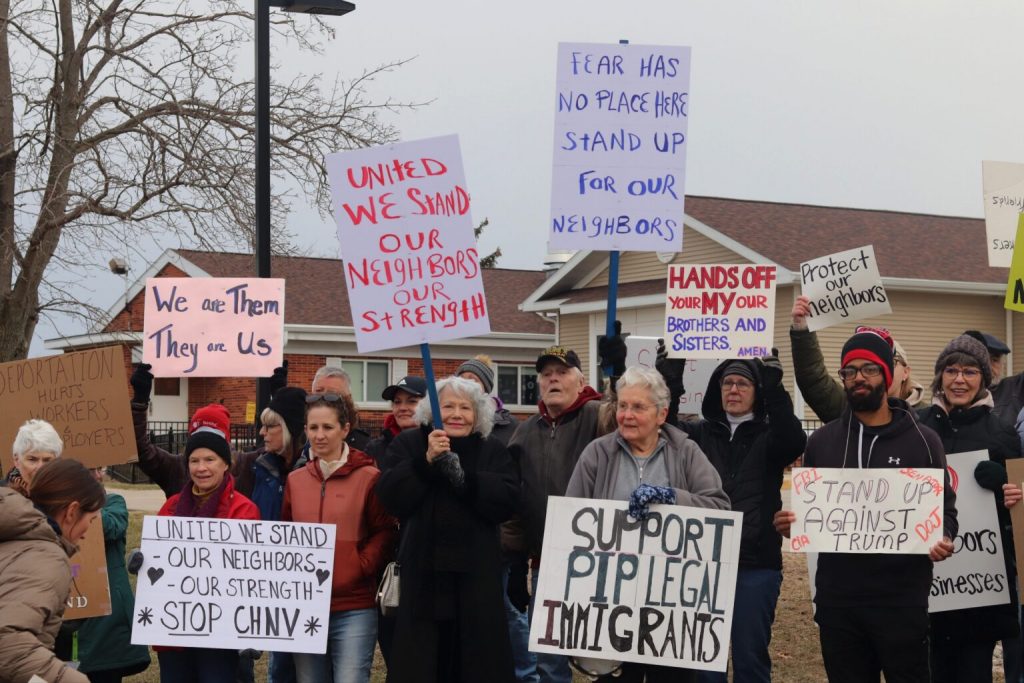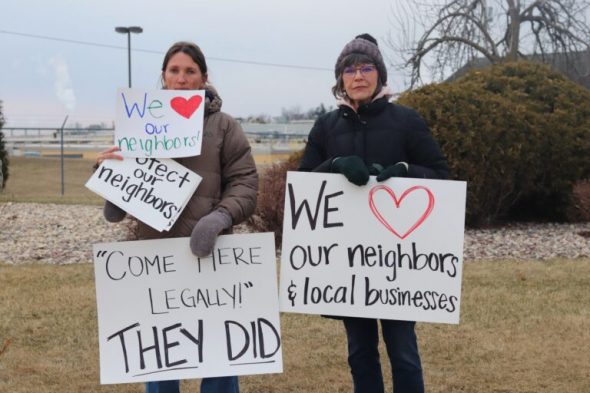Trump Order Threatens Haitian Immigrants in New London, WI
'They're part of our community,' residents say, opposing deportation order.

Some of the 40 residents of New London who came out Wednesday morning to support migrants, many of whom work at Tyson Foods across the street from where they held a rally. (Photo by Jason Kerzinkski for the Wisconsin Examiner)
In 2023 a group of Haitian immigrants began arriving in the central Wisconsin community of New London.
The Haitians were admitted to the U.S. through a humanitarian parole program in response to lawlessness and deadly violence in their homeland. The newcomers became part of the community, said immigration attorney Marc Christopher, a New London resident whose law offices are in Appleton and Milwaukee.
The legal refugee program through which they were admitted includes a work authorization. More than 100 of the new immigrants ended up working at a Tyson Foods plant in New London, processing and packaging chicken. Others went to work at stores in the community or in other jobs.
In late March, however, the Trump administration told more than a half-million people from Haiti, Cuba, Nicaragua and Venezuela that they were no longer welcome. The order from the Department of Homeland Security, terminating humanitarian parole for about 532,000 refugees from the four nations, is one of a flurry of orders targeting millions of immigrants in the U.S. since President Donald Trump took office.
Haitians in New London were among those covered by the March 25 order. They were notified through an online account assigned to every humanitarian parole refugee, Christopher said.
Since the notices arrived, Christopher has been scrambling, trying to help a handful of people who hope they might qualify to stay in the U.S. Other New London residents have been organizing on behalf of their new Haitian neighbors.
On Wednesday morning Christopher and his wife, Eloisa De León also an immigration attorney, joined about 40 residents of New London gathered across the street from the local Tyson plant, carrying signs advertising their support for the Haitian workers there and hoping to send a message to the community.
“The message is intended for everyone,” said one participant, Sue Krejcarek. “There are people who maybe were Republicans, voted Republican, but don’t agree with this. It’s OK to protest against things you don’t agree with, whether you voted Republican, Democrat. When something is wrong, you stand up for it.”

Emily Tseffos, left, with the grassroots group Forward New London, organized a rally Wednesday morning to support migrants in the community whose legal authorization has been revoked by the Trump administration. (Photo by Jason Kerzinkski for the Wisconsin Examiner)
Emily Tseffos helped organize the demonstration along with a group of New London activists.
“These folks have established life here because they were expecting to be able to stay here,” Tseffos said. “They came here through legal means. And they are working and paying taxes and they are going to schools and they are dreaming of starting businesses.”
School officials have been working closely with the Haitian families, Tseffos said, and teachers who have the children of Haitian parents in their classrooms participated in the Wednesday morning rally. Community volunteers have been offering financial help with bills and groceries as the immigrant families grapple with the sudden command to go or face deportation.
“They were not planning on having 30 days notice to leave,” Tseffos said. “And so it’s really sad to see that these folks that are doing everything right and everything they’re supposed to be doing are now facing deportation in a couple weeks here.”
In addition to the notification from the federal government, Tyson plant employees who were permitted to work under the humanitarian parole program have received letters from the company telling them that their employment authorization will expire April 23 — the day before their deadline to leave the U.S.
Christopher said that he has sought to put together applications for a small number of people for whom he could make a case for asylum.
“An asylum claim is one of the more difficult and time-consuming things I do as an attorney,” he said. Asylum claims are decided on a case-by-case basis and require extensive factual details. Claims perceived as frivolous can meet with severe penalties.
An asylum applicant cannot get a work authorization for six months, however, Christopher said. That means even if the application is granted, “if they lose their work on April 24, those families have no means for supporting themselves,” he said.
Christopher remains outraged at the way his neighbors’ lives have been overturned. “They’ve been promised they could stay here,” he said. “They came through legally, and they’ve been vetted.”
To be suddenly ejected “is not good for them,” Christopher said. “And it’s not good for our community, either.”
Trump end to humanitarian parole hits Wisconsin town where Haitians are part of the community was originally published by the Wisconsin Examiner.
If you think stories like this are important, become a member of Urban Milwaukee and help support real, independent journalism. Plus you get some cool added benefits.






















This is just sick!
Thoughtless.
Cruel.
NOT my America.
Donald Trump is offering an expedited pathway for US Citizenship for white Afrikaners from South Africa because he states that they are being “treated terribly”. His over racism exceedes the racism of any past presidents in our history. Any injustices that immigrant minorities experience do not count as being “treated terribly”.